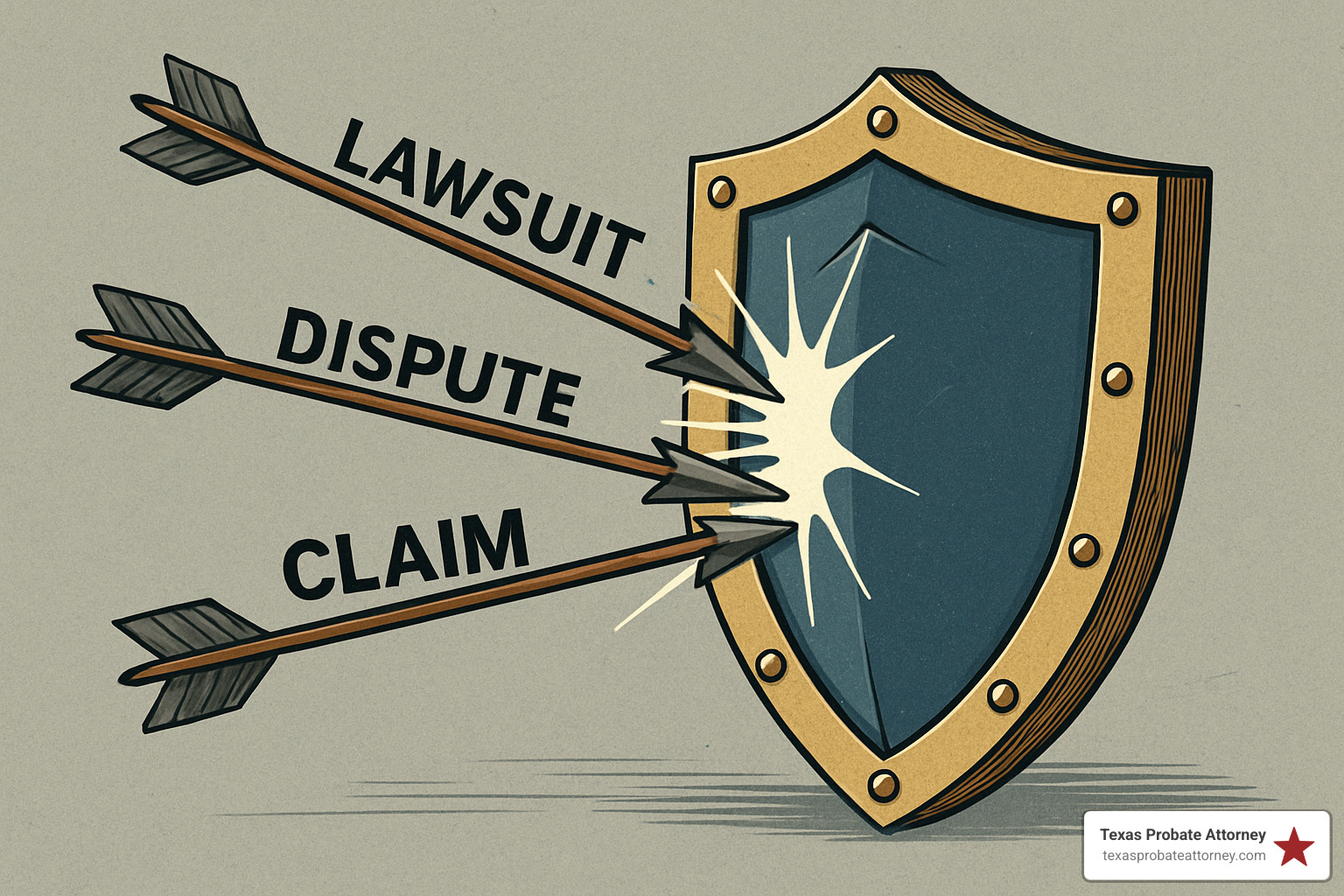Steer Clear of Lawsuits with These Simple Steps
Why Learning How to Avoid Litigation Should Be Your Top Priority
Litigation drains money, time, and energy in ways that are difficult to appreciate until you are in the middle of a lawsuit. The financial costs extend far beyond legal fees to include court costs, expert witness fees, and lost business opportunities. Even a “win” can feel like a loss once you count the months or even years of distraction, the stress of depositions and hearings, and the irreparable strain on business and family relationships. In our decades of experience with Texas probate and business disputes, we’ve seen that skipping court altogether is almost always the cheaper—and saner—choice.
Quick Steps to Avoid Litigation
- Communicate clearly – Ambiguity is a lawsuit’s best friend. Put promises, expectations, and agreements in writing to eliminate confusion.
- Use written contracts – A handshake deal relies on memory, which fades and can be disputed. A written contract provides a clear, enforceable record of the agreement.
- Maintain proper insurance – Shift catastrophic financial risks, like a major accident or professional error, to insurance carriers who are equipped to handle them.
- Resolve disputes early – Small disagreements can fester and grow into expensive legal battles. Addressing problems at the start is far more cost-effective.
- Seek legal counsel – An attorney can help you steer complex situations and provide guidance before positions harden and conflicts escalate.
- Keep detailed records – Contemporaneous notes, emails, and logs are powerful evidence because they capture events as they happen, not as they are remembered years later.
- Practice transparency – Operating with honesty and openness builds trust and lowers the suspicion that often fuels legal disputes.
An insurance-industry study shows that even strong cases fail roughly 1 in 10 times. On average, U.S. companies pour more than $1 million a year into litigation expenses they could have prevented. The emotional cost is harder to measure but just as real, affecting your health, your family, and your focus.
The upshot: a modest investment in prevention now can spare you and your family the immense financial and emotional toll of a courtroom battle.
The Foundation: Proactive Planning and Clear Communication

Think of dispute prevention like maintaining a healthy relationship—honest discussion and clear expectations keep everyone on the same page. Misunderstandings, not outright bad acts, fuel most lawsuits we see in probate and business settings. For example, a parent might casually tell one child, “The antique clock will be yours someday,” but if that promise isn’t formally documented in a will, it can create profound conflict and suspicion among siblings after the parent’s death.
- At least half of attorney–client conflicts trace back to poor communication.
- Families regularly end up in court because heirs never discussed who would receive certain assets, leading to incorrect assumptions.
Why Clear Communication Matters
When roles, deadlines, and deliverables are unmistakable, assumptions disappear—and assumptions are what tend to land people in court. A written agreement is simply harder to fight about than a memory of “what Dad said.” Clear communication is about setting and managing expectations from the outset. For employees, this means clear job descriptions and regular performance feedback. For customers, it means a detailed scope of work. For heirs, it means open family conversations about estate intentions, which can prevent feelings of being blindsided or treated unfairly.
- Written vs. verbal – A signed email, a formal contract, or a meeting summary beats “he said, she said” every time. It creates a reference point that is objective and difficult to dispute.
- Managing expectations – Employees, customers, and heirs who know the rules and understand the plan rarely feel surprised, which significantly reduces the likelihood of a dispute.
Could Mediation Solve Our Family Dispute?
Document Everything: Create a Paper Trail
Contemporaneous notes—made when events actually happen—carry real weight with judges and juries. Your documentation should be a regular business practice, not something you only do when you sense trouble. Capture:
- Meeting minutes with action items and decisions
- Key email threads confirming important conversations
- Policy acknowledgements signed by employees
- Performance reviews and any disciplinary actions
- Transaction records, invoices, and proofs of payment
- Change orders for projects
- Notes from conversations about estate planning wishes
A few minutes of note-taking today can save thousands of dollars and countless hours of stress tomorrow.
Crafting Your Legacy: A Guide to Writing a Meaningful Family Letter
Fortifying Your Position with Robust Legal Documentation

Vague documents invite lawsuits. Precise ones stop them before they can start. Investing time and resources into creating clear, comprehensive legal documents is one of the most effective preventative measures you can take. This includes:
- Written contracts for vendors, clients, and partners
- Employee handbooks that clearly outline policies, procedures, and consequences
- Standard operating procedures (SOPs) that reduce errors and ensure consistency
- Wills, trusts, and powers of attorney that leave no room for guessing or interpretation
A contract that says “paint the house” is litigation waiting to happen. A strong contract, by contrast, will specify the exact surfaces to be prepped and painted, the brand and color of paint, the number of coats, the cleanup standards, the total cost, the payment schedule, and the deadline for completion. This level of detail closes the door on arguments.
Choose the Right Business Structure
Sole proprietorships and general partnerships are simple to form, but they leave your personal assets—your home, savings, and car—exposed to business debts and lawsuits. Forming a Limited Liability Company (LLC) or a corporation creates a legal shield between your business and personal finances. However, this protection only works if you respect the “corporate veil.” This means you must maintain separate bank accounts, keep clean records, and operate the business as a distinct legal entity, not a personal piggy bank.
Forming a limited liability company (LLC)
Need help? Our Fort Worth Asset Protection Lawyer can walk you through the options to protect what you’ve built.
The Power of Well-Drafted Contracts and Estate Plans
Good documents anticipate potential problems and provide a roadmap for how to handle them. They should clearly spell out:
- Scope of work or asset distribution: What exactly is being done or given?
- Payment or inheritance terms: How much, when, and under what conditions?
- Change-order or amendment procedures: How will you handle changes to the original plan?
- Dispute-resolution paths: Will you require mediation before a lawsuit can be filed?
- Termination conditions: What happens if one party needs to end the relationship?
Estate plans deserve equal detail. A will that simply says “divide my estate equally among my children” is unclear if one child predeceases the parent, if one child has special needs, or if the estate’s main asset is an indivisible family business. A well-drafted plan addresses these contingencies, potentially including buyout provisions or instructions for a trustee, to avoid probate warfare among loved ones.
The Importance of Having a Will
Why You Should Avoid DIY Wills
How to Avoid Litigation Through Smart Risk Management

Effective risk management involves identifying potential legal threats early and taking proactive steps to mitigate them. For most businesses and individuals, this means focusing on a few key areas where disputes commonly arise:
- Insurance – This is the primary tool for shifting catastrophic financial costs to an insurer.
- Workplace safety – Preventing employee injuries is the best way to avoid workers’ compensation and personal injury claims.
- Intellectual property – You must actively protect your brand names, logos, and creative assets from infringement.
- Cybersecurity – A data breach can trigger devastating class-action lawsuits and regulatory fines.
- Due diligence – Thoroughly screen potential business partners, key hires, and acquisition targets to avoid importing their legal problems.
Secure the Right Insurance Coverage
Don’t just buy a generic policy. Match your coverage to your specific risks. Key policies include:
- Commercial general liability (CGL): Covers bodily injury or property damage to third parties.
- Errors & omissions (E&O): Also known as professional liability, this is crucial for service providers as it covers claims of negligence or mistakes.
- Cyber liability: Protects against losses from data breaches and other cyber events.
- Directors & officers (D&O): Shields executives from personal liability for their management decisions.
- Workers’ compensation: Required in most states, it covers medical expenses and lost wages for employee injuries.
Review your coverage annually with your agent. A policy that fit your startup may be dangerously inadequate for a growing company.
Maintain a Safe and Compliant Environment
Simply meeting the minimum OSHA regulations is not enough. Strive to create a true culture of safety. This shows good faith and significantly reduces the risk of negligence claims. A strong safety program combines regular employee training, documented equipment maintenance schedules, proactive hazard inspections, and a clear, non-punitive incident reporting system.
Protect Your Intellectual Property
Your brand and ideas are valuable assets. Register your trademarks with the USPTO, secure copyrights for creative works, and use non-disclosure agreements (NDAs) to guard trade secrets when dealing with employees and partners. Proactively monitoring for infringement and sending cease-and-desist letters is far cheaper than suing for damages after the fact.
The World Intellectual Property Organization (WIPO)
When Disputes Arise: Strategies for Out-of-Court Resolution
Even with the best prevention, conflicts can still happen. When they do, turning to Alternative Dispute Resolution (ADR) instead of the courthouse can often save money, time, and critical relationships.
Resolve Legal Disputes Without Courtroom
Negotiation and Compromise
Direct, good-faith talks can solve many problems quickly and inexpensively. The key is to prepare. Before entering a negotiation, understand your goals and your bottom line, including your Best Alternative to a Negotiated Agreement (BATNA). Focus on shared interests and creative business solutions rather than digging into rigid legal positions. Issuing threats and ultimatums will stall progress; genuine curiosity about the other side’s perspective can open up solutions.
Mediation and Arbitration
When direct negotiation fails, a neutral third party can help. The two most common forms are mediation and arbitration, and they are very different:
- Mediation: A neutral facilitator (the mediator) helps the parties communicate, identify areas of agreement, and work toward their own voluntary settlement. The mediator does not impose a decision. This process is collaborative, confidential, and excellent for preserving relationships, making it ideal for family probate disputes and business partner disagreements.
- Arbitration: This is a more formal process, like a private trial. Each side presents evidence and arguments to a neutral arbitrator (or a panel), who then issues a binding decision. The process is faster and more private than court, but it is adversarial, and the arbitrator’s ruling is typically final with very limited rights to appeal.
Both processes are faster, more confidential, and usually far cheaper than taking a case to a public trial.
Using Mediation in Probate Cases
Could Mediation Solve Our Family Dispute?
Mediation Arbitration Services Attorneys
Frequently Asked Questions about Avoiding Litigation
What are the most common reasons a business gets sued?
Breach of contract, employee grievances (like wrongful termination or discrimination), customer disputes over products or services, intellectual-property infringement, partnership break-ups, and negligence claims (like slip-and-fall accidents) top the list. The good news is that clear documents, consistent procedures, and good communication can prevent the vast majority of them.
Is it always cheaper to settle a case than go to court?
In most cases, yes. The costs of litigation—including legal fees, expert witnesses, and the value of your own time—can easily exceed the amount in dispute. However, some matters justify the fight, such as defending your core intellectual property, deterring a flood of similar frivolous claims, or fighting a lawsuit that could cause reputational ruin. It’s crucial to run a cost-benefit analysis with your attorney before deciding on a strategy.
What is the first step if I think a lawsuit is possible?
First, do no harm. Do not destroy or alter any related documents, emails, or records. Preserve all potential evidence. Second, gather all relevant paperwork and create a timeline of events. Third, call a lawyer immediately. Early legal advice is critical. An attorney can help you understand your rights and obligations, preserve legal privileges, and explore settlement options or defenses you might otherwise overlook.
How can a detailed estate plan prevent a will contest in Texas?
A well-drafted estate plan, created with an experienced attorney, is the best defense against a will contest. It can include provisions like a no-contest (or in terrorem) clause, which disinherits any beneficiary who challenges the will. Furthermore, by working with an attorney, you create a record that demonstrates you had the required testamentary capacity and were not under undue influence, which are the most common grounds for a will contest in Texas.
Free Consultation Probate Attorney
Your Best Defense Is a Proactive Offense
At Keith Morris & Stacy Kelly, Attorneys at Law, we have spent decades watching preventable disputes destroy families and businesses across Texas. The lesson from the front lines is clear: the time and money spent on proactive planning is a fraction of the cost of a courtroom battle. The legal system is designed to resolve conflicts after they happen; it is not designed to prevent them. Prevention is a choice you make.
- Comprehensive estate plans stop inheritance wars before they begin.
- Clear contracts keep business partners aligned and focused on growth.
- Early mediation can preserve family and business relationships that litigation would shatter.
Waiting until you are served with a lawsuit severely limits your options and puts you on the defensive. Taking action now protects your wealth, preserves harmony, and secures future opportunities. Whether you are managing a family estate in Houston, running a business in Austin, or planning for the future in Fort Worth, our team can help you build a strong legal foundation.
Texas Fiduciary Litigation Attorney
An ounce of prevention is truly worth a pound of cure. Reach out to our experienced team today to gain the peace of mind that comes from knowing you have taken the right steps to safeguard what matters most.

